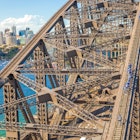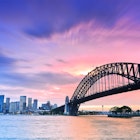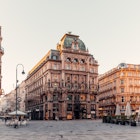

In some parts of the world January means hunkering down and hibernating to avoid the chill, but elsewhere hotter climes mean the cultural offerings are just warming up, so thereтs never been a better time for temple hopping, festivals and celebrating Christmas т again!
And lovers of the cold are also in luck, with places like Vienna embracing the glitz and glamour of the snowy season with its famed balls.

Celebrate Christmas and Timkat among ancient sites and dry weather in Ethiopia
Thereтs nowhere quite like Ethiopia: the religion, the languages, the food, the coffee т oh, the coffeeтІ Even clocks and calendars throw up quirks: new year is 11 September, but itтs on 7 January that Christmas (Leddet or Gena) is celebrated by throngs of devotees among the frescoed subterranean churches of Lalibela, carved into the solid rock in the 12th and 13th centuries. A bigger spectacle still is Timkat, commemorating Jesusт baptism; itтs most dramatic among the 17th-century castles of Gonder, where priests march tabots т replicas of the Ark of the Covenant т to Fasildasт Bath for an overnight vigil followed by splashy baptisms. Away from the gladdened crowds thereтs space to explore Ethiopiaтs other wonders in this dry, cool month. North of Gonder loom the ancient stelae (obelisks) of Aksum, and trails meandering among gelada monkeys and precipitous ridges of the Simien Mountains, while to the south lies Lake Tana, lined with medieval monasteries.
Trip plan: Fly into capital Addis Ababa, from where domestic flights link Lalibela, Gonder, Aksum and Bahir Dar (for Lake Tana), allowing at least 10 days.
Need to know: Timkat is usually 19 January, but 20th in Ethiopian leap years.
Other months: Oct-Apr т largely dry; May-Sep т wet in many areas.

Get a cultural kick with the diverse acts of the Sydney Festival
Sure, itтs hot, itтs busy and itтs brash т but Sydney in midsummer is also thrilling and plain gorgeous. January ushers in the hundreds of events comprising the Sydney Festival, three weeks of everything from circus and country to opera and film scores via dance performances, art installations, burlesque shows and family activities. Beyond the events and opera house, beaches and bridge, though, Sydneyтs natural wonders beg to be explored. Discover new perspectives on the harbour with a walk т the Manly to Spit Bridge route, perhaps т or head a little further to roam the lush forests, Aboriginal rock art and cool coastal breezes of or Royal National Park (the worldтs second national park, gazetted in 1879).
Trip plan: After a few days enjoying the cultural and culinary delights of the city, branch out to explore the nearby parks т Ku-ring-gai Chase offers great hiking and mountain biking.
Need to know: Youтll need an Opal Card to use public transport, including ferries т pick up and load a card with a minimum of A$10 at convenience stores across the city.
Other months: Dec-Feb т summer, hot, busier; Mar-Apr т autumn, more rain; May-Aug т winter, cooler, can be drier than summer; Sep-Nov т spring, dry, warm.

Cruise the Ayeyarwady River and explore the temples of Bagan, Myanmar (Burma), under a warm sun
Myanmar is, it could fairly be claimed, Asiaтs warmest country. Not measured in celsius or fahrenheit, but in the smiles of its unfailingly welcoming people. Its roster of sights, sounds and smells is enticing, too: the тwinking wonderт of golden in former capital Yangon; the pony-drawn carriages and strawberries of hill station Pyin Oo Lwin; the temples and leg-rowing fishermen of serene Inle Lake. The ideal тroad to Mandalayт is a ribbon not of tarmac but water: the Ayeyarwady (Irrawaddy) River, snaking between Yangon and that former royal capital, and in full flow in January. Board an old-style riverboat for a cruise past rural landscapes, villages and ancient sites т none more jaw-dropping than the vast plain of Bagan, studded with thousands of millennium-old stupas, pagodas and temples.
Trip plan: Yangon and Mandalay receive international flights. A two-week counterclockwise circuit from Yangon takes in the golden-boulder-balanced stupa at Kyaiktiyo, Inle Lake and hilltribes around Kalaw, Pyin Oo Lwin and Mandalayтs temples and palace, before cruising downstream via Bagan and the Ayeyarwady delta.
Need to know: The entrance fee for Bagan Archaeological Zone, currently 25,000 kyat (about US$22), is valid for five days.
Other months: Oct-Apr т dry (Dec-Feb: peak season, cooler); May-Sep т rainy, hot, prices lower.

Waltz in the wintry glamour of Viennaтs famed ball season
The Austrian capital enchants in any season, its melange of baroque and art nouveau, imperial grandeur and cafe culture endlessly appealing. But to admire the city resplendent in all its finery, visit during the peak ball season т January into February, when some 300-plus balls entertain tux and gown-clad socialites waltzing the night away. And though events sport names such as Doctorsт, Lawyersт and Huntersт Ball, many are open to all т simply buy a ticket (well in advance), dress up for the occasion and prepare to be dazzled by the atmosphere and music. Of course, the city doesnтt just wake at night т it continues to bustle under a wintry cloak of snow each day, with palaces, churches and museums to explore т donтt miss the imperial , (Art History) Museum or the bling baroque palaces and . And with coffee and cake beckoning from charming cafes on every street corner, plus hip bars and restaurants lining streets around the city, itтs a culinary delight, too.
Trip plan: Arrive, explore, waltz, eat and drink!
Need to know: Strict dress codes apply at most balls т tuxedo or dinner jacket for men, gowns for women. These may be hired at various stores in the city.
Other months: Year-round т busy; Jan-Feb т ball season; Jun-Aug т summer, busiest.
Looking for more inspiration? Check out our new book for 360 ultimate escapes from family-friendly adventures to animal encounters and relaxing retreats.
Explore related stories



 Festivals & EventsChristmas dinners around the world: choose your favorite festive dishes
Festivals & EventsChristmas dinners around the world: choose your favorite festive dishesNov 22, 2024 тЂ 5 min read

 Festivals & Events10 of the world's best places to celebrate New Yearтs Eve
Festivals & Events10 of the world's best places to celebrate New Yearтs EveNov 13, 2024 тЂ 7 min read


 BooksGreat reads from РЯАФУХСљКЯВЪПЊНБМЧТМ: "A ticket to Vienna" by Ann Patchett
BooksGreat reads from РЯАФУХСљКЯВЪПЊНБМЧТМ: "A ticket to Vienna" by Ann PatchettOct 22, 2024 тЂ 8 min read

